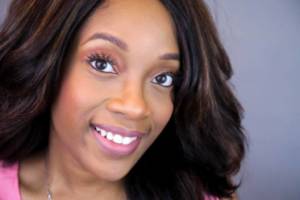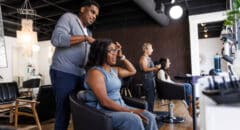 For the majority of the last 5 years I’ve worn my hair in its natural state every day to work and in that time I’ve noticed that different hairstyles receive different reactions from my coworkers. Now that we are well into the second coming of the natural hair movement, our curls and coils are something of the new norm.
For the majority of the last 5 years I’ve worn my hair in its natural state every day to work and in that time I’ve noticed that different hairstyles receive different reactions from my coworkers. Now that we are well into the second coming of the natural hair movement, our curls and coils are something of the new norm.
Honestly, I love this. Back when I first decided to go natural I remember I was always one of a few, and constantly got questions and criticism from both strangers and familiar folks. Now, there are a lot more natural girls walking around rocking their fro’s and protective styles so I’m rarely asked anything about my hair. But even with the general acceptance of natural hair in society at large; I find that I, along with a great number of black women, still have apprehension about wearing our hair naturally at work.
You can see men and women with afros in ad campaigns everywhere, movies, TV shows and in the music industry. The natural hair movement has touched nearly every aspect of society but even so, it feels as if black women are still made to seem like anything but normal when in the workplace. I know this isn’t the case in every place of work, but the experiences we are having don’t happen in a vacuum.
Anytime we change our hair it has the possibility to become a day or week-long conversation in the office. For some, the attention may be welcomed but for me, I’d just like to do my work and go home. Not have conversations about how and why my hair does what it does while dodging unwelcomed fingers flying towards my head. Yes, it’s happened and unfortunately, yes they still have all their fingers. I get the most of these encounters orcomments on my hair when I wear it straight after it being kinky and fluffy for weeks. I’m sure that doesn’t surprise you at all, as we are all made to feel that straighter is greater so my straight hair is treated like a great relief to my white coworkers.
I’ve also noticed that there is even a difference in how people respond to the different natural styles I wear. When I wear my hair in a neat rod-out or twist out I always get compliments but after a few days of not retwisting my hair, those manufactured curls turn into tightly wound, frizzy coils the compliments shift to everything but my hair if I get any at all. In my own personal experience I’ve never been blatantly discriminated against because of my hair or explicitly told “Do not wear your hair this way”, but the types of comments I get send a message about where we really are as a society.
Comments like “I like your hair like that”, “your hair is so pretty today” and “Oh! You did your hair!” when I wear my hair straight are deeply coded responses to the point where the commentators often may be unaware of how problematic they are actually being. Yeah, I’m giving them the benefit of the doubt here.
Those people and their micro-aggressive words are saying “Your hair should be straight and if you must wear it curly then wear it neatly curled, in a way that I can understand it”. And I would love to say their reactions don’t affect how I choose to wear my hair but to be honest, sometimes it does. Before interviews or even on a regular basis I, and I’m sure a lot of my natural sistas, have a mental battle about what to do with our hair so that it won’t ruffle feathers, be too noticeable or too ethnic.
Keeping our hair natural should be an easy stress-free thing but instead, we end up spending a lot of time, money and energy developing and maintaining a hair care routine in order to keep our natural looking a certain way. There is an insane amount of pressure from both inside and outside of the community to have the right kind of natural. Typically this looks like loose, type 3 ringlet curls, where the hair falls over the shoulders in silky, bouncy coils. If your hair doesn’t look like this and god forbid you to have the kinky, type 4 stuff, you’d better keep it neatly twisted, edges slicked and tamed to be accepted.
Being a girl with thick, type 4 hair I can tell you thatduring my transition I heard a lot of “You hair is too thick to be natural” and alternatively, “You’ll be fine as long as your not one of those naturals that don’t comb their hair” from people whose hair, sans perm, would look just like mine.
The natural transition period is already mentally complicated enough. You’re shedding your addiction to relaxers, straight hair, and the mental complexities that go along with accepting how you look with highly textured hair. Then add in the monkey wrench of being told that you still have to look a certain way in order to be deemed appropriate. It’s exhausting.
Literally, I’m tired of twisting my hair every.single.night in order to keep neatly arranged curls. The nerve wrecking upkeep is honestly another form of code-switching if you think about it, but this time we are code-switching for our people as well as outsiders.
After observing and absorbing all of this information I’ve found that dealing with these reactions is just the next phase in my long natural hair journey, the part that no youtube tutorial taught me about. After letting go of the practice of chemically altering your hair in order to be accepted you have to free yourself of manually altering your hair as well. My hair isn’t always in the perfect ringlet or loopy curls of a fresh twist out and it shouldn’t have to be. It has taken me a long time to get to this point but I’m happy that I have arrived.
Internally I battle with the part of me that doesn’t care if my hair is ‘presentable’ and theme that dreads the stares and inevitable questions. Ultimately I want to find a balance between the two and grow a genuine love for my hair without the voice of assimilation inside working me like a puppet. For the sake of our daughters and ourselves, we have to realize that our hair isn’t always curly and that’s okay too.
As long as it’s healthy and flourishing who cares! I dare you to rock a wild afro like Solange and Zazee beets or a tight, asymmetrical shaped fro like Lupita and dare anyone to question your beauty! Natural hair love is about loving your hair the way it naturally is no matter what anyone says or feels about it. Be unapologetically Black and unapologetically YOU. Everybody else will just have to deal.

Brittany Wright, B.A in Creative writing and English – University of Illinois Champaign-Urbana, is an aspiring writer and creator of the She’s Wright blog. This black, millennial mom loves everything beauty, motherhood, and marriage related!








